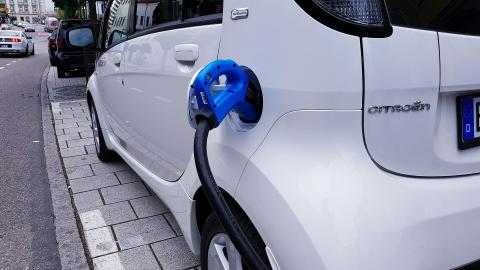How Can Dealers Prepare for the EV Change?

For what seems like forever, electric vehicles have been talked about as “the car of the future.” Technically this is still true, except the future is here, right in front of us. Aside from companies like Tesla, which is 100% electric, many OEMs have shifted their focus to electrification and have released big claims of the majority of their vehicles being electric within the next 10-20 years. GM says they will be all electric by 2035, and Ford claims that 40% of their inventory will be electric by 2030. So now that leaves us with the big question… What should dealers do to be ready for the EV shift?
Covid-19 should have dealerships somewhat used to the need for quick change and what it means to stay relevant. There are changes needed within and outside of dealerships. For example, selling and maintaining EVs requires training and some upgrades or additions to equipment in the service department. Salespeople will need to be knowledgeable about EV technology to make it simple for the buyer to learn and make a decision.
The fact is that EV is still considerably new, especially for consumers who are just starting to learn about it. Sales staff can be that bridge that leads people into a new world of electric vehicles.
Just as important, service technicians will need to be trained on how to safely and properly service EVs, what they require, and what to look for when it comes to wear-and-tear. The maintenance is quite different from traditional ICEs. There will be a learning curve, and getting started now might help dealers stay ahead of it. Dealers will definitely have a competitive edge over independent shops as OEM dealer technicians will gain first access to learning about this new technology. These vehicles are harder to work on, and it’s extremely dangerous if you don’t know what you’re doing.
We all know that training and equipment are just the beginning of the costs to make this switch. Becoming EV certified, on top of what it costs to get a dealership ready to sell a whole new lineup of cars is expensive - very expensive. We are talking about an investment of hundreds-of-thousands of dollars to become an electric-savvy dealership.
On one hand, it seems like dealers don’t have a choice if they want to sell the vehicles, which is the reality. That said, it doesn’t seem fair that OEMs are pushing so hard for dealers to sell their electric vehicles but haven’t put forth any funds to help with the costs. Cadillac told its dealers that EV was the future, and if they aren’t willing to invest, that they would buy back the franchise. Of 787 dealers, 200 said they weren’t interested, meaning they will either attempt to sell in the near future or that GM (or other OEMs) will be buying back quite a few franchises. An OEM’s ROFR clause in the Sales & Service Agreement will make it all but impossible for the dealer to sell in the “open market.” GM can then “lowball” the dealer who cannot afford to make this change!
On the flip side, Volkswagen of America is leading by example, offering to pay half the costs to get all of its dealers’ facilities ready for selling and servicing EVs. Maybe others will jump on that bandwagon to make this a smoother transition.
Notably, at this juncture, there is little incentive for dealers to get on board. It’s hard to get excited about something that you’re forced to do and have to pay for, especially for a product that has a total market share of about 11%. Plus, let’s not forget about the loss of fixed ops gross profit! Doesn’t “hold water”...OEM hype is doing that, and there are plenty of exciting ICEs which are more appealing.
Ford can testify that there are consumers ready to buy electric vehicles. Within a week of announcing the new F-150 Lightning, Ford received 70,000 reservations (albeit not a very large number overall considering the pick-up unit sales per year). There is something to be said about the unknowns and newness of electric vehicles that make buyers excited to get involved. All the tax credits and rebates make it an easier choice as well.
From an economic standpoint, it will create jobs for techs as EVs will need to be serviced as well as ICE vehicles. There is also an opportunity for dealers and brands to lead with an environment-friendly stance and add diversity to their markets (e.g. VW).
Importantly, the government continues to plan for this electrification wave. President Biden has and continues to push for electric vehicles to be what consumers primarily buy, and he says that half of all car sales will be electric by 2030. In his infrastructure bill, $7.5 billion is included for electric charging stations, which pave a vital path for EV to be successful long term.
Unfortunately, EV threatens the traditional dealer business model. The agency model is coming as automakers shift to an online-first approach. Plus legislation in some states allows electric-only retailers to bypass the traditional dealer model, and several states have started changing legal requirements for electric vehicles. California, for example, will ban the sale of new ICE vehicles starting in 2035. Vermont has a consumer incentive program to encourage buyers to choose EV. As a result, automakers will likely start shifting more to the agency approach to stay competitive with already successful EV brands. It’s vital that as this change happens dealers should demand appropriate agent commissions and/or fees. What’s fair is fair.
Luckily, the National Automobile Dealers Association Dealers has the capability of organizing and leading the kind of nationwide campaign needed right now to emphasize the benefits of the franchised system (for consumers and for automakers) and to push back against this relentless effort to denigrate the nation's neighborhood new-vehicle dealers.
Dealers should push them to fight back against organizations like the recently renamed Alliance for Automotive Innovation and the Zero Emission Transportation Association. They seek to paint dealers as a vestige of the past and portray the franchised dealer network as an obstacle. But the reality is that franchised branded dealers are — and always have been — the most efficient and reliable go-to-market strategy for new and innovative automotive products and services, as they are supportive of and trusted in their local communities!.
It’s safe to say that there is a lot going on right now in the automotive industry and dealerships will see a lot of change. Ultimately, automakers will likely be forced to go all-electric in the next 20-30 years, so investing in that change now could help dealers stay relevant and profitable for many years to come. Now is not the time to be comfortable. Dealers should be getting proactive about the future of their businesses.






